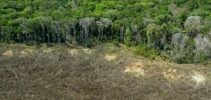🌱 Study proposes biodiversity credits to unlock financing
An analysis (🇬🇧), released this week by the UN Development Program (UNDP) and the International Institute for Environment and Development (IIED), suggested a solution to unlock the flow of resources for the protection of biodiversity global – the use of credits linked to conservation initiatives.
ADVERTISING
Named “biocredits”, the idea is that they serve under the same logic as the famous carbon credits. Companies could offset the impacts of their operations on biodiversity from the purchase of credits arising from conservation projects, which would sell these benefits in exchange for more resources to finance their maintenance and expansion.
"The biocredits offer a tangible solution to the challenge of how to finance nature conservation and restoration,” defended Tom Mitchell (*), executive director of IIED. “Evidence from biocredit schemes already shows that they can help preserve precious plants, animals and ecosystems, but also significantly channel finance to local communities and indigenous peoples, who are the most effective guardians of biodiversity.”
The proposal should be discussed at the UN Biodiversity Conference, COP15, which starts this Wednesday (7) in Montreal, Canada.
ADVERTISING
☀️ The advancement of renewable energies
The global energy crisis has given an “unprecedented boost” to the development of renewable energy, whose growth will increase in the next five years as much as in the last 20, announced this Tuesday (6) the International Energy Agency (IEA).
Over the next five years, growth in global renewable capacity is expected to nearly double, says IEA's annual report on renewable energy. Thanks to this accelerated development, the energies Wind and solar will overtake coal as the main source of electricity production by 2025.
In terms of technology, onshore wind and solar energy sources currently represent the cheapest means of producing electricity in most countries.
ADVERTISING
The installation of solar panels on the roofs of homes and businesses will triple in the next five years.
And the demand for biofuels will grow 22%, thanks to production and subsidies from the United States, Canada, Brazil, Indonesia and India.
🍃 Air pollution is linked to newborn deaths
Nearly one million annual deaths of premature babies worldwide can be attributed to air pollution, highlighted a study published last week in the journal Nature Communications. (🇬🇧).
ADVERTISING
The research, the first to analyze global data, estimated that almost half of stillbirths may be linked to exposure to particulate matter of the PM2.5 type, produced mainly by burning fossil fuels.
To carry out the study, the researchers selected 137 low- and middle-income countries that, according to data from the Department of Health Research (DHS🇬🇧) – a division of the United States Agency for International Development (USAID) – are home to 98% of the global incidence of stillbirths.
They crossed these mortality numbers with other data from Air Quality Guidelines (🇬🇧) from the World Health Organization (WHO), detailing the severity of PM2.5 pollution in each of these countries. The results drew a clear line between particle emissions and the incidence of stillbirths.
ADVERTISING
🌳 Deforestation increases the cost of climate change for agribusiness
O deforestation, one of the main causes of local climate change, combined with global climate change, brings significant impacts to the Brazilian agribusiness.
Between 1985 and 2012, deforestation caused an average reduction of 12% in the productivity of soybean cultivation in the Amazon and 6% in the Cerrado, with a decrease of more than 20% in some regions of the two biomes.
These are some of the highlights of the most recent technical note from WWF-Brazil, which compiles relevant studies on the topic. They reaffirm the intimate relationship between deforestation, climate change and agricultural productivity. The survey points out that high rates of deforestation in the Amazon and Cerrado result in a drop in productivity and profitability for Brazilian agribusiness.
Read also
Curto Verde is a daily summary of what you need to know about the environment, sustainability and other topics linked to our survival and that of the planet.
(🚥): may require registration and/or signature
(🇬🇧): content in English
(*): content in other languages is translated by Google Tradutor






